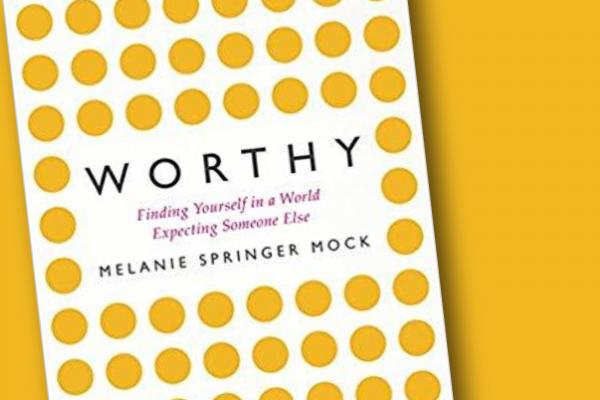WHEN MELANIE MOCK, author of the new book Worthy: Finding Yourself in a World Expecting Someone Else, realized as a teen that her newly acquired designer jeans would not lead her to immediate popularity, she bumped into questions I’m sure many of us face: Where does our worth come from? How do we get to the point where we truly believe we are worthy and beloved just as we are, as the children of God? Through sometimes humorous, sometimes heartrending, and always poignantly honest stories from her own experience, Mock opens the vulnerable space within to attend to the stories we tell ourselves about our value.
Mock’s stories point out the hidden messages about worthiness given to us by American culture, in particular the evangelical subculture, contrasting the messages of the “purity culture” with the biblical promises of our innate belovedness. She builds on the groundwork laid in If Eve Only Knew: Freeing Yourself from Biblical Womanhood and Becoming All God Meant for You to Be (Chalice Press), which she co-wrote with Kendra Weddle Irons.
While she focuses primarily on the messages given to white evangelical women, since this is her experience, she recognizes her privilege, as well as the parallels between the unhealthy and often impossible implicit standards American evangelicals hold for women, people of color, and LGBTQ+ folks, all who do not meet a white male “norm.” Mock addresses how evangelical cultures tend to create double standards for women, requiring a type of “purity” that has nothing to do with Christianity. She shares honestly about the fear that even when she seems to be fitting the mold of the ideal Christian woman, at any moment the façade of the successful mother/wife/professor will be unmasked.
While Mock describes herself as “not a biblical scholar or a theologian,” the author of the foreword, Carolyn Custis James, begs to differ: “This is theology at its best,” theology that invites us into a deeper understanding of ourselves and God through the medium of personal story and struggle. As we thrive in our own worthiness, Mock argues that we will no longer need to break one another down to raise our own status, no longer need to fear that if people know us, they will no longer see us as valuable. Instead, by opening ourselves up to our own uniqueness and seeing through the damaging lies of the purity culture, we can see one another’s intrinsic value.
Mock is very aware that structural injustice will not be solved through individual actions, addressing this in sections regarding feminism, her ambivalence around international adoptions, and her awareness of the racial injustices her adopted sons encounter. But she encourages readers to deepen their journeys of spiritual transformation through living into their own worthiness. This transformative process can give courage and hope to those working toward the Beloved Community, a more sustained way to flourish because it is not based on external affirmation but grounded firmly in experiencing the radical love of God.

Got something to say about what you're reading? We value your feedback!






